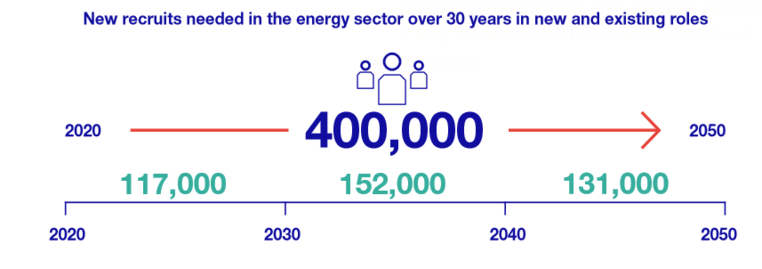A looming threat to renewable energy projects
One critical challenge threatens to derail the renewable energy transition: the growing skills crisis.
Imagine this: Your organisation secures off-taker interest with a long-term PPA, lands prime real estate, and is first in line for a grid connection contract. Everything seems aligned—except for one major hurdle. There aren’t enough skilled professionals to bring the project to life. If this sounds familiar, you’re not alone. The renewable energy sector faces a skills shortage threatening global clean energy goals.
The scale of the renewable energy skills shortage
The numbers paint a stark picture:
The European Union’s REPowerEU initiative demands the creation of over 3.5 million new jobs by 2030 to support its energy strategy.
In the UK alone, an additional 200,000 workers are needed to meet net-zero targets. According to the UK’s Net Zero Energy Workforce Report, this shortfall could double to 400,000 by 2050.

Sonia Dunlop, CEO of the Global Solar Council, warns, “The solar power sector could expand by up to 1 TW annually from 2030, but we need a significantly larger skilled workforce to sustain this growth.”
Why traditional workforce development efforts fall short
Several sector-wide initiatives—such as the Renewable Energy Skills Partnership, the Net-Zero Industry Act, and the Pact for Skills—aim to tackle the issue. However, these approaches have limitations:
- Time Lag: Many programs are still in their infancy, and large-scale training infrastructure takes years to mature.
- Geopolitical Barriers: Global cooperation is essential, but political conflicts (e.g., Russia-Ukraine) disrupt progress.
- Supply Chain Uncertainty: Stable access to technology and equipment is crucial, yet renewable energy supply chains remain volatile.
- Fragmented Approaches: With multiple initiatives running simultaneously, a lack of coordination can lead to inefficiencies and slow adoption.
- Limited Focus on Decision-Makers: Most initiatives target technical workers but overlook the professionals responsible for bringing projects from concept to completion.
As Ben Backwell, CEO of the Global Wind Energy Council, aptly states, “Without a skilled and sustainable workforce for wind and renewable energy, the energy transition will not materialise in a timely manner.”
It leaves me wondering, can your organisation afford to wait?
Proactive organisations are redefining talent development
Research from ARMSA Academy highlights a game-changing approach: companies taking control of their skills pipeline rather than relying solely on industry-wide initiatives. Here’s how leading organisations are getting ahead:
A new model for renewable energy workforce development
Learning in the workflow
Traditional classroom training is becoming obsolete. ARMSA’s research reveals that professionals learn best by tackling real-world challenges in real-time.
Critical thinking over compliance
Forward-thinking companies prioritise decision-making skills that balance safety, efficiency, and profitability—moving beyond simple compliance training.
Digital performance support
Providing immediate access to on-demand knowledge and tools within the workflow enhances efficiency and problem-solving.
The competitive edge of early movers
Companies that embrace these innovative workforce strategies are already seeing measurable benefits:
- Lower construction costs in the short term
- Reduced operating expenses over time
- Decreased unplanned plant downtime
- Improved collaboration across departments
- More robust decision-making frameworks
As one industry leader put it, “Fail to plan; plan to fail.”
Will your organisation lead or lag behind?
The renewable energy skills gap isn’t a distant challenge—it’s a pressing issue expanding right now. While sector-wide initiatives remain critical, your organisation has the power to act immediately.
Learn from industry leaders
Want to understand how the most successful renewable energy companies are tackling the skills crisis? Download our exclusive research report featuring insights from professionals across 40 countries and 35.6 GW of installed capacity.
Don’t let the skills gap slow your organisation’s momentum. The future of renewable energy depends on the actions we take today.






